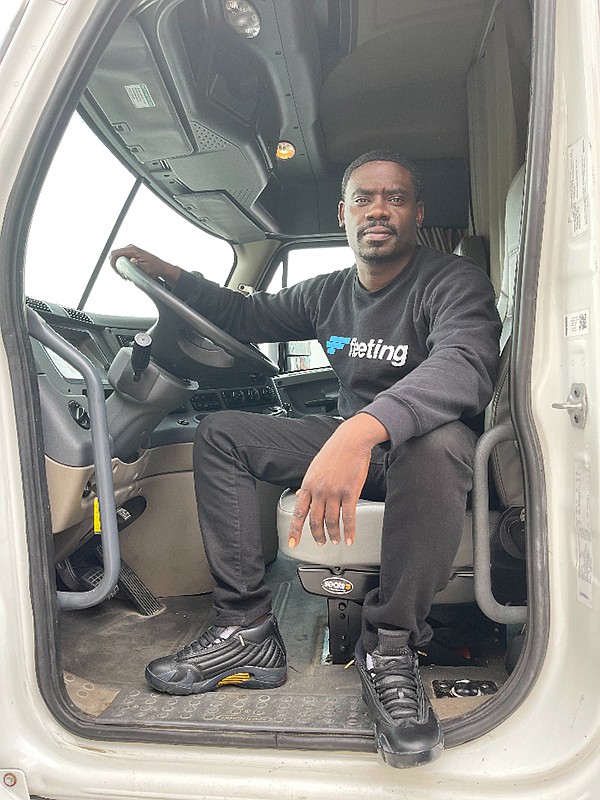By creating an “Airbnb for trucks,” Pierre Laguerre is aiming to create a tight-knit, cohesive network of individuals that wants to push the trucking industry forward. | Photo by Fleeting
IMPORT/EXPORT
Fleeting Aims to Change the Trucking Industry
A new platform is aiming to push the trucking industry forward by pairing independent truck owners with licensed drivers to create a scalable fleet.
Fleeting is a commercial trucking and fleet-management-services company that was founded in 2019 by Pierre Laguerre. A former truck driver, Laguerre eventually purchased his own truck to start his business and then realized there weren’t any resources for truckers that help them transition into business owners. He created Fleeting to bring a new business model to the trucking industry to make it more appealing and create more jobs.
Fleeting seeks to pair truck drivers with underutilized vehicles and create an “Airbnb for trucks” by providing available vehicles for drivers looking for work. Anyone who owns a truck can join the service and be paired with available drivers. Fleeting wants to create a tight-knit, cohesive network of individuals that wants to push the trucking industry forward.
“People see trucking as a viable investment opportunity but don’t necessarily know how to manage a trucking company. Fleeting allows anyone to own a truck and register it to our platform, where our platform will take care of everything from finding licensed drivers, freight, parking and insurance,” Laguerre said. “It’s like owning a luxury apartment to list on Airbnb for passive income.”
According to the American Trucking Association, the country is currently facing a truck-driver shortage of 80,000 people, an all-time high. The driver shortage is a contributing factor in the current supply-chain issues being felt across the country. Laguerre said that more than 70 percent of goods transported across the country are through trucking. Many cite the long hoursand stress as a major factor for quitting.
Fleeting intends to provide flexibility for truck drivers so that they aren’t working such long hours away from home. Laguerre noted that a lot of truck drivers are leaving the trucking industry to drive for Uber or Lyft as these companies allow them to work long hours but still go home to their families. He said Fleeting would entice more people to obtain a commercial driver’s license if the same amount of flexibility could be brought to the trucking industry.
The company also works to provide a positive social impact on the community by providing a training program for formerly incarcerated men and women to provide them with the tools and education needed to obtain a commercial driver’s license. Laguerre said the company is also looking at how to bring more women into the trucking industry, not just as drivers but as fleet owners as well.
Recently, the company received a seed-round investment of $500,000 from NBA player Kyrie Irving’s new consulting firm, KAI 11 Consulting, and Lockstep Ventures, a new venture-fund firm founded by Michael Loeb, Bonin Bough and Marcus Glover. The investment from the two firms will help Fleeting continue to grow its social-impact goals by hiring and training people from marginalized communities.
Glover, general and managing partner for Lockstep Ventures, believes Fleeting can help bring a solution to the current supply-chain issues. Lockstep was founded on the basis of empowering founders who aim to provide a positive social impact and saw an opportunity with Fleeting to create a diverse workforce and diversify an industry.
“The apparel industry doesn’t exist without really smart supply-chain solutions like Fleeting,” Glover said. “The ability to ship and receive goods on time and satisfy customers, which the world is increasingly struggling with—we ask the industry to be on the lookout for players like Fleeting that are trying to empower customers.”
Laguerre mentioned that all supply-chain and logistics leaders need to come together to help solve the current supply-chain issues and push the industry forward so the issues don’t arise again.
“This is an $800 billion industry, and 92 percent of the companies in this industry are companies that own six trucks or less. A lot of these smaller businesses can’t invest in the technology that helps grow their companies, and a lot of supply-chain issues are really just an effect of bad business procedures that caused the industry to be behind on technology,” Laguerre said.






















